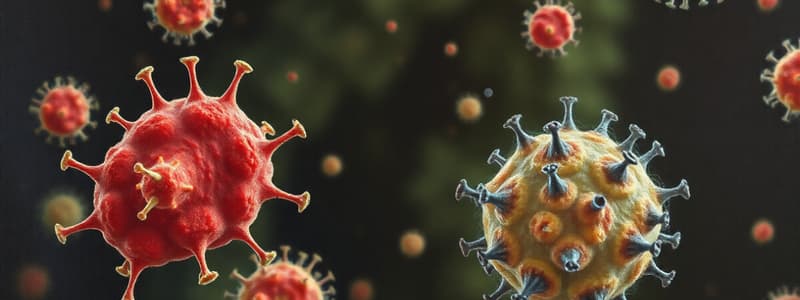Podcast
Questions and Answers
What is a pathogen?
What is a pathogen?
A biological infectious agent that causes disease or illness to its host.
Which of the following are types of antigens?
Which of the following are types of antigens?
- Foreign microorganisms
- Tumor cells
- Transfused blood
- All of the above (correct)
What must T cells require for recognizing an antigen?
What must T cells require for recognizing an antigen?
- Binding to antibodies
- Presence of MHC I only
- Direct contact
- Presentation by Antigen Presenting Cells (correct)
What is the definition of an immunogen?
What is the definition of an immunogen?
Haptens are complete antigens that can stimulate antibody production without a carrier.
Haptens are complete antigens that can stimulate antibody production without a carrier.
What are exogenous antigens?
What are exogenous antigens?
What is an epitope?
What is an epitope?
Which factor does NOT determine antigenicity?
Which factor does NOT determine antigenicity?
Study Notes
Definition of Pathogens and Antigens
- Pathogens are infectious biological agents causing disease or illness in hosts.
- Antigens (Ags) can be foreign substances like microorganisms and toxins, or body proteins expressed abnormally (e.g., tumor cells, transfused blood, transplanted organs).
- Immunogenicity refers to the ability to induce an immune response.
Recognition of Antigens
- Antigens are found on the surface and inside bacteria or viruses.
- T cells and B cells recognize these antigens.
- T cells need antigens to be ingested, degraded, and presented by Antigen Presenting Cells (APCs) alongside Major Histocompatibility Complex (MHC) proteins.
Classification of Antigens
- Antigens can be classified based on:
- Immunogenicity
- Origin
- Source
- Biological classification
Immunogenicity
- Complete antigens (immunogens) can stimulate antibody formation.
- Haptens are small molecules that require conjugation with larger molecules to induce antibody production.
Origin of Antigens
- Exogenous antigens enter the body from outside sources (inhalation, ingestion, injection) and are processed by APCs, presented to helper T cells via MHC type II.
- Endogenous antigens are generated within cells, either from metabolism or pathogen infections, and presented to cytotoxic T cells with MHC type I.
Epitope or Antigenic Determinant
- An epitope is a specific site on an antigen that binds with antibodies or T cell receptors.
Determinants of Antigenicity
- Factors affecting antigenicity include:
- Size: Larger molecules are more antigenic.
- Nature of the antigen
- Foreignness of the substance
- Susceptibility to tissue enzymes
- Exposure to the antigen
- Presence of adjuvants
- Antigenic specificity
Studying That Suits You
Use AI to generate personalized quizzes and flashcards to suit your learning preferences.
Description
This quiz covers the definitions, recognition, and classification of pathogens and antigens. It explores the roles of T cells and B cells in recognizing these biological agents and the concept of immunogenicity. Test your knowledge on how these components interact in the immune response.




